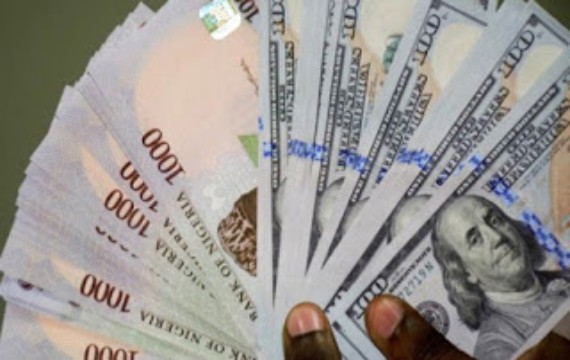Nigeria's currency the Naira extended its fall against the US dollar marginally at the official market on Thursday.
The local unit dropped to a four-month low against the greenback, trading at N575 per dollar at the parallel market.
According to data posted on the FMDQ website where forex is officially traded, the domestic unit closed at N416.67 per $1 at the close of trade on Thursday, which represents a N0.17 or 0.04 per cent devaluation from N416.50 it closed in the previous session on Wednesday.
In the past fortnight, the currency has been hovering within the price benchmark of N416.00 -N416.67 to a dollar at the spot market.
At the official market on Thursday, the domestic unit hit an intraday high of N410.00 and a low of N444.00 before closing at N416.67 at the close of trade.
Parallel market exchangers at Uyo traded the naira with the hard currency at N573.00 and sold at N580.00 to a dollar on Thursday.
Similarly in Abuja's Street market, currency dealers said they exchanged at N573.00 and sold at N575.00 per $1 on Thursday.
The CBN had in the last year taken major steps to stabilize the naira. The apex bank introduced the naira-for-dollar policy allowing foreign currency recipients to earn N5 for every dollar sent.
The CBN had promised that the new policy would provide Nigerians in the Diaspora with cheaper and more convenient ways of sending remittances to the country.
CBN Governor, Godwin Emefiele said the policy implementation would increase the transparency of remittance inflows and reduce rent-seeking activities.
He expressed optimism that the policy extension will encourage banks and financial institutions to develop products and investments vehicles, geared towards attracting investments from Nigerians in the diaspora.
Managing Director, Financial Derivatives Company Limited, Bismarck Rewane, attributed the naira’s continued decline to a heightened forex supply shortage, demand pressure and rationing. He said naira rates convergence would require the adoption of a full floating exchange rate system determined by the forces of demand and supply.
Likewise, the International Monetary Fund (IMF) said exchange rate rigidities have constrained the economy’s ability to absorb external shocks.
The IMF insisted that restrictions on access to foreign exchange for certain categories of goods, and multiple exchange rates create distortions in both private and public sectors decision making. They discourage long-term investment, encourage smuggling and provide avenues for corruption.
Moving forward, the Fund suggested removal of foreign exchange restrictions, and a full exchange rate unification, in line with the authorities’ Economic Recovery and Growth Plan (ERGP), will help keep the parallel market premium low in a more sustained manner.





